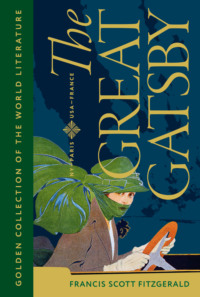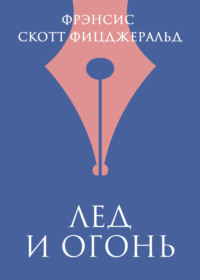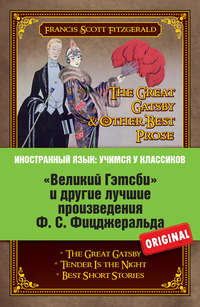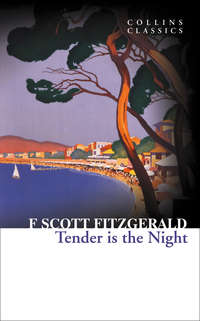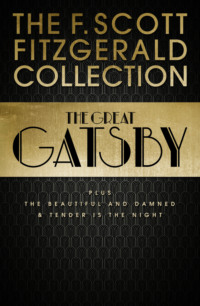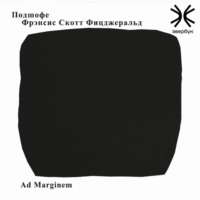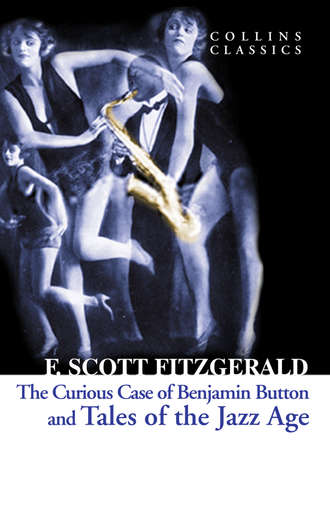
Полная версия
Tales of the Jazz Age
“I’m thinkin’ of leavin’ town” continued the Jelly-bean, absorbed by his own thoughts. “Been thinkin’ of goin’ up on the farm, and takin’ a little that work off Uncle Dun. Reckin I been bummin’ too long.”
Clark was silent and the Jelly-bean continued:
“I reckin maybe after Aunt Mamie dies I could sink that money of mine in the farm and make somethin’ out of it. All my people originally came from that part up there. Had a big place.”
Clark looked at him curiously.
“That’s funny,” he said. “This—this sort of affected me the same way.”
The Jelly-bean hesitated.
“I don’t know,” he began slowly, “somethin’ about—about that girl last night talkin’ about a lady named Diana Manners—an English lady, sorta got me thinkin’!” He drew himself up and looked oddly at Clark, “I had a family once,” he said defiantly.
Clark nodded.
“I know.”
“And I’m the last of ’em,” continued the Jelly-bean his voice rising slightly, “and I ain’t worth shucks. Name they call me by means jelly—weak and wobbly like. People who weren’t nothin’ when my folks was a lot turn up their noses when they pass me on the street.”
Again Clark was silent.
“So I’m through, I’m goin’ to-day. And when I come back to this town it’s going to be like a gentleman.”
Clark took out his handkerchief and wiped his damp brow.
“Reckon you’re not the only one it shook up,” he admitted gloomily. “All this thing of girls going round like they do is going to stop right quick. Too bad, too, but everybody’ll have to see it thataway.”
“Do you mean,” demanded Jim in surprise, “that all that’s leaked out?”
“Leaked out? How on earth could they keep it secret. It’ll be announced in the papers to-night. Doctor Lamar’s got to save his name somehow.”
Jim put his hands on the sides of the car and tightened his long fingers on the metal.
“Do you mean Taylor investigated those checks?”
It was Clark’s turn to be surprised.
“Haven’t you heard what happened?”
Jim’s startled eyes were answer enough.
“Why,” announced Clark dramatically, “those four got another bottle of corn, got tight and decided to shock the town—so Nancy and that fella Merritt were married in Rockville at seven o’clock this morning.”
A tiny indentation appeared in the metal under the Jelly-bean’s fingers.
“Married?”
“Sure enough. Nancy sobered up and rushed back into town, crying and frightened to death—claimed it’d all been a mistake. First Doctor Lamar went wild and was going to kill Merritt, but finally they got it patched up some way, and Nancy and Merritt went to Savannah on the two-thirty train.”
Jim closed his eyes and with an effort overcame a sudden sickness.
“It’s too bad,” said Clark philosophically. “I don’t mean the wedding—reckon that’s all right, though I don’t guess Nancy cared a darn about him. But it’s a crime for a nice girl like that to hurt her family that way.”
The Jelly-bean let go the car and turned away. Again something was going on inside him, some inexplicable but almost chemical change.
“Where you going?” asked Clark.
The Jelly-bean turned and looked dully back over his shoulder.
“Got to go,” he muttered. “Been up too long; feelin’ right sick.”
“Oh.”
The street was hot at three and hotter still at four, the April dust seeming to enmesh the sun and give it forth again as a world-old joke forever played on an eternity of afternoons. But at half past four a first layer of quiet fell and the shades lengthened under the awnings and heavy foliaged trees. In this heat nothing mattered. All life was weather, a waiting through the hot where events had no significance for the cool that was soft and caressing like a woman’s hand on a tired forehead. Down in Georgia there is a feeling—perhaps inarticulate—that this is the greatest wisdom of the South—so after a while the Jelly-bean turned into a poolhall on Jackson Street where he was sure to find a congenial crowd who would make all the old jokes—the ones he knew.
The Camel’s Back
I suppose that of all the stories I have ever written this one cost me the least travail and perhaps gave me the most amusement. As to the labor involved, it was written during one day in the city of New Orleans, with the express purpose of buying a platinum and diamond wrist watch which cost six hundred dollars. I began it at seven in the morning and finished it at two o’clock the same night. It was published in the “Saturday Evening Post” in 1920, and later included in the O. Henry Memorial Collection for the same year. I like it least of all the stories in this volume.
My amusement was derived from the fact that the camel part of the story is literally true; in fact, I have a standing engagement with the gentleman involved to attend the next fancy-dress party to which we are mutually invited, attired as the latter part of the camel—this as a sort of atonement for being his historian.
I
The glazed eye of the tired reader resting for a second on the above title will presume it to be merely metaphorical. Stories about the cup and the lip and the bad penny and the new broom rarely have anything, to do with cups or lips or pennies or brooms. This story Is the exception. It has to do with a material, visible and large-as-life camel’s back.
Starting from the neck we shall work toward the tail. I want you to meet Mr. Perry Parkhurst, twenty-eight, lawyer, native of Toledo. Perry has nice teeth, a Harvard diploma, parts his hair in the middle. You have met him before—in Cleveland, Portland, St. Paul, Indianapolis, Kansas City, and so forth. Baker Brothers, New York, pause on their semi-annual trip through the West to clothe him; Montmorency & Co. dispatch a young man post-haste every three months to see that he has the correct number of little punctures on his shoes. He has a domestic roadster now, will have a French roadster if he lives long enough, and doubtless a Chinese tank if it comes into fashion. He looks like the advertisement of the young man rubbing his sunset-colored chest with liniment and goes East every other year to his class reunion.
I want you to meet his Love. Her name is Betty Medill, and she would take well in the movies. Her father gives her three hundred a month to dress on, and she has tawny eyes and hair and feather fans of five colors. I shall also introduce her father, Cyrus Medill. Though he is to all appearances flesh and blood, he is, strange to say, commonly known in Toledo as the Aluminum Man. But when he sits in his club window with two or three Iron Men, and the White Pine Man, and the Brass Man, they look very much as you and I do, only more so, if you know what I mean.
Now during the Christmas holidays of 1919 there took place in Toledo, counting only the people with the italicized the, forty-one dinner parties, sixteen dances, six luncheons, male and female, twelve teas, four stag dinners, two weddings, and thirteen bridge parties. It was the cumulative effect of all this that moved Perry Parkhurst on the twenty-ninth day of December to a decision.
This Medill girl would marry him and she wouldn’t marry him. She was having such a good time that she hated to take such a definite step. Meanwhile, their secret engagement had got so long that it seemed as if any day it might break off of its own weight. A little man named Warburton, who knew it all, persuaded Perry to superman her, to get a marriage license and go up to the Medill house and tell her she’d have to marry him at once or call it off forever. So he presented himself, his heart, his license, and his ultimatum, and within five minutes they were in the midst of a violent quarrel, a burst of sporadic open fighting such as occurs near the end of all long wars and engagements. It brought about one of those ghastly lapses in which two people who are in love pull up sharp, look at each other coolly and think it’s all been a mistake. Afterward they usually kiss wholesomely and assure the other person it was all their fault. Say it all was my fault! Say it was! I want to hear you say it!
But while reconciliation was trembling in the air, while each was, in a measure, stalling it off, so that they might the more voluptuously and sentimentally enjoy it when it came, they were permanently interrupted by a twenty-minute phone call for Betty from a garrulous aunt. At the end of eighteen minutes Perry Parkhurst, urged on by pride and suspicion and injured dignity, put on his long fur coat, picked up his light brown soft hat, and stalked out the door.
“It’s all over,” he muttered brokenly as he tried to jam his car into first. “It’s all over—if I have to choke you for an hour, damn you!” The last to the car, which had been standing some time and was quite cold.
He drove downtown—that is, he got into a snow rut that led him downtown. He sat slouched down very low in his seat, much too dispirited to care where he went.
In front of the Clarendon Hotel he was hailed from the sidewalk by a bad man named Baily, who had big teeth and lived at the hotel and had never been in love.
“Perry,” said the bad man softly when the roadster drew up beside him at the curb, “I’ve got six quarts of the doggonedest still champagne you ever tasted. A third of it’s yours, Perry, if you’ll come up-stairs and help Martin Macy and me drink it.”
“Baily,” said Perry tensely, “I’ll drink your champagne. I’ll drink every drop of it, I don’t care if it kills me.”
“Shut up, you nut!” said the bad man gently. “They don’t put wood alcohol in champagne. This is the stuff that proves the world is more than six thousand years old. It’s so ancient that the cork is petrified. You have to pull it with a stone drill.”
“Take me up-stairs,” said Perry moodily. “If that cork sees my heart it’ll fall out from pure mortification.”
The room up-stairs was full of those innocent hotel pictures of little girls eating apples and sitting in swings and talking to dogs. The other decorations were neckties and a pink man reading a pink paper devoted to ladies in pink tights.
“When you have to go into the highways and byways—” said the pink man, looking reproachfully at Baily and Perry.
“Hello, Martin Macy,” said Perry shortly, “where’s this stone-age champagne?”
“What’s the rush? This isn’t an operation, understand. This is a party.”
Perry sat down dully and looked disapprovingly at all the neckties.
Baily leisurely opened the door of a wardrobe and brought out six handsome bottles.
“Take off that darn fur coat!” said Martin Macy to Perry. “Or maybe you’d like to have us open all the windows.”
“Give me champagne,” said Perry.
“Going to the Townsends’ circus ball to-night?”
“Am not!”
“’Vited?”
“Uh-huh.”
“Why not go?”
“Oh, I’m sick of parties,” exclaimed Perry. “I’m sick of ’em. I’ve been to so many that I’m sick of ’em.”
“Maybe you’re going to the Howard Tates’ party?”
“No, I tell you; I’m sick of ’em.”
“Well,” said Macy consolingly, “the Tates’ is just for college kids anyways.”
“I tell you—”
“I thought you’d be going to one of ’em anyways. I see by the papers you haven’t missed a one this Christmas.”
“Hm,” grunted Perry morosely.
He would never go to any more parties. Classical phrases played in his mind—that side of his life was closed, closed. Now when a man says “closed, closed” like that, you can be pretty sure that some woman has double-closed him, so to speak. Perry was also thinking that other classical thought, about how cowardly suicide is. A noble thought that one—warm and inspiring. Think of all the fine men we should lose if suicide were not so cowardly!
An hour later was six o’clock, and Perry had lost all resemblance to the young man in the liniment advertisement. He looked like a rough draft for a riotous cartoon. They were singing—an impromptu song of Baily’s improvisation:
“One Lump Perry, the parlor snake,
Famous through the city for the way he drinks his tea;
Plays with it, toys with it
Makes no noise with it,
Balanced on a napkin on his well-trained knee—”
“Trouble is,” said Perry, who had just banged his hair with Baily’s comb and was tying an orange tie round it to get the effect of Julius Caesar, “that you fellas can’t sing worth a damn. Soon’s I leave the air and start singing tenor you start singin’ tenor too.”
“’M a natural tenor,” said Macy gravely. “Voice lacks cultivation, tha’s all. Gotta natural voice, m’aunt used say. Naturally good singer.”
“Singers, singers, all good singers,” remarked Baily, who was at the telephone. “No, not the cabaret; I want night egg. I mean some dog-gone clerk ‘at’s got food—food! I want—”
“Julius Caesar,” announced Perry, turning round from the mirror. “Man of iron will and stern ‘termination.”
“Shut up!” yelled Baily. “Say, iss Mr. Baily sen’ up enormous supper. Use y’own judgment. Right away.”
He connected the receiver and the hook with some difficulty, and then with his lips closed and an expression of solemn intensity in his eyes went to the lower drawer of his dresser and pulled it open.
“Lookit!” he commanded. In his hands he held a truncated garment of pink gingham.
“Pants,” he exclaimed gravely. “Lookit!”
This was a pink blouse, a red tie, and a Buster Brown collar.
“Lookit!” he repeated. “Costume for the Townsends’ circus ball. I’m li’l’ boy carries water for the elephants.”
Perry was impressed in spite of himself.
“I’m going to be Julius Caesar,” he announced after a moment of concentration.
“Thought you weren’t going!” said Macy.
“Me? Sure I’m goin’, Never miss a party. Good for the nerves—like celery.”
“Caesar!” scoffed Baily. “Can’t be Caesar! He is not about a circus. Caesar’s Shakespeare. Go as a clown.”
Perry shook his head.
“Nope; Caesar.”
“Caesar?”
“Sure. Chariot.”
Light dawned on Baily.
“That’s right. Good idea.”
Perry looked round the room searchingly.
“You lend me a bathrobe and this tie,” he said finally. Baily considered.
“No good.”
“Sure, tha’s all I need. Caesar was a savage. They can’t kick if I come as Caesar, if he was a savage.”
“No,” said Baily, shaking his head slowly. “Get a costume over at a costumer’s. Over at Nolak’s.”
“Closed up.”
“Find out.”
After a puzzling five minutes at the phone a small, weary voice managed to convince Perry that it was Mr. Nolak speaking, and that they would remain open until eight because of the Townsends’ ball. Thus assured, Perry ate a great amount of filet mignon and drank his third of the last bottle of champagne. At eight-fifteen the man in the tall hat who stands in front of the Clarendon found him trying to start his roadster.
“Froze up,” said Perry wisely. “The cold froze it. The cold air.”
“Froze, eh?”
“Yes. Cold air froze it.”
“Can’t start it?”
“Nope. Let it stand here till summer. One those hot ole August days’ll thaw it out awright.”
“Goin’ let it stand?”
“Sure. Let ’er stand. Take a hot thief to steal it. Gemme taxi.”
The man in the tall hat summoned a taxi.
“Where to, mister?”
“Go to Nolak’s—costume fella.”
II
Mrs. Nolak was short and ineffectual looking, and on the cessation of the world war had belonged for a while to one of the new nationalities. Owing to unsettled European conditions she had never since been quite sure what she was. The shop in which she and her husband performed their daily stint was dim and ghostly, and peopled with suits of armor and Chinese mandarins, and enormous papier-mâché birds suspended from the ceiling. In a vague background many rows of masks glared eyelessly at the visitor, and there were glass cases full of crowns and scepters, and jewels and enormous stomachers, and paints, and crape hair, and wigs of all colors.
When Perry ambled into the shop Mrs. Nolak was folding up the last troubles of a strenuous day, so she thought, in a drawer full of pink silk stockings.
“Something for you?” she queried pessimistically. “Want costume of Julius Hur, the charioteer.”
Mrs. Nolak was sorry, but every stitch of charioteer had been rented long ago. Was it for the Townsends’ circus ball?
It was.
“Sorry,” she said, “but I don’t think there’s anything left that’s really circus.”
This was an obstacle.
“Hm,” said Perry. An idea struck him suddenly. “If you’ve got a piece of canvas I could go’s a tent.”
“Sorry, but we haven’t anything like that. A hardware store is where you’d have to go to. We have some very nice Confederate soldiers.”
“No. No soldiers.”
“And I have a very handsome king.”
He shook his head.
“Several of the gentlemen” she continued hopefully, “are wearing stovepipe hats and swallow-tail coats and going as ringmasters—but we’re all out of tall hats. I can let you have some crape hair for a mustache.”
“Want somep’n ‘stinctive.”
“Something—let’s see. Well, we have a lion’s head, and a goose, and a camel—”
“Camel?” The idea seized Perry’s imagination, gripped it fiercely.
“Yes, but It needs two people.”
“Camel. That’s the idea. Lemme see it.”
The camel was produced from his resting place on a top shelf. At first glance he appeared to consist entirely of a very gaunt, cadaverous head and a sizable hump, but on being spread out he was found to possess a dark brown, unwholesome-looking body made of thick, cottony cloth.
“You see it takes two people,” explained Mrs. Nolak, holding the camel in frank admiration. “If you have a friend he could be part of it. You see there’s sorta pants for two people. One pair is for the fella in front, and the other pair for the fella in back. The fella in front does the lookin’ out through these here eyes, an’ the fella in back he’s just gotta stoop over an’ folla the front fella round.”
“Put it on,” commanded Perry.
Obediently Mrs. Nolak put her tabby-cat face inside the camel’s head and turned it from side to side ferociously.
Perry was fascinated.
“What noise does a camel make?”
“What?” asked Mrs. Nolak as her face emerged, somewhat smudgy. “Oh, what noise? Why, he sorta brays.”
“Lemme see it in a mirror.”
Before a wide mirror Perry tried on the head and turned from side to side appraisingly. In the dim light the effect was distinctly pleasing. The camel’s face was a study in pessimism, decorated with numerous abrasions, and it must be admitted that his coat was in that state of general negligence peculiar to camels—in fact, he needed to be cleaned and pressed—but distinctive he certainly was. He was majestic. He would have attracted attention in any gathering, if only by his melancholy cast of feature and the look of hunger lurking round his shadowy eyes.
“You see you have to have two people,” said Mrs. Nolak again.
Perry tentatively gathered up the body and legs and wrapped them about him, tying the hind legs as a girdle round his waist. The effect on the whole was bad. It was even irreverent—like one of those mediaeval pictures of a monk changed into a beast by the ministrations of Satan. At the very best the ensemble resembled a humpbacked cow sitting on her haunches among blankets.
“Don’t look like anything at all,” objected Perry gloomily.
“No,” said Mrs. Nolak; “you see you got to have two people.”
A solution flashed upon Perry.
“You got a date to-night?”
“Oh, I couldn’t possibly—”
“Oh, come on,” said Perry encouragingly. “Sure you can! Here! Be good sport, and climb into these hind legs.”
With difficulty he located them, and extended their yawning depths ingratiatingly. But Mrs. Nolak seemed loath. She backed perversely away.
“Oh, no—”
“C’mon! You can be the front if you want to. Or we’ll flip a coin.”
“Make it worth your while.”
Mrs. Nolak set her lips firmly together.
“Now you just stop!” she said with no coyness implied. “None of the gentlemen ever acted up this way before. My husband—”
“You got a husband?” demanded Perry. “Where is he?”
“He’s home.”
“Wha’s telephone number?”
After considerable parley he obtained the telephone number pertaining to the Nolak penates and got into communication with that small, weary voice he had heard once before that day. But Mr. Nolak, though taken off his guard and somewhat confused by Perry’s brilliant flow of logic, stuck staunchly to his point. He refused firmly, but with dignity, to help out Mr. Parkhurst in the capacity of back part of a camel.
Having rung off, or rather having been rung off on, Perry sat down on a three-legged stool to think it over. He named over to himself those friends on whom he might call, and then his mind paused as Betty Medill’s name hazily and sorrowfully occurred to him. He had a sentimental thought. He would ask her. Their love affair was over, but she could not refuse this last request. Surely it was not much to ask—to help him keep up his end of social obligation for one short night. And if she insisted, she could be the front part of the camel and he would go as the back. His magnanimity pleased him. His mind even turned to rosy-colored dreams of a tender reconciliation inside the camel—there hidden away from all the world …
“Now you’d better decide right off.”
The bourgeois voice of Mrs. Nolak broke in upon his mellow fancies and roused him to action. He went to the phone and called up the Medill house. Miss Betty was out; had gone out to dinner.
Then, when all seemed lost, the camel’s back wandered curiously into the store. He was a dilapidated individual with a cold in his head and a general trend about him of downwardness. His cap was pulled down low on his head, and his chin was pulled down low on his chest, his coat hung down to his shoes, he looked run-down, down at the heels, and—Salvation Army to the contrary—down and out. He said that he was the taxicab-driver that the gentleman had hired at the Clarendon Hotel. He had been instructed to wait outside, but he had waited some time, and a suspicion had grown upon him that the gentleman had gone out the back way with purpose to defraud him—gentlemen sometimes did—so he had come in. He sank down onto the three-legged stool.
“Wanta go to a party?” demanded Perry sternly.
“I gotta work,” answered the taxi-driver lugubriously. “I gotta keep my job.”
“It’s a very good party.”
“’S a very good job.”
“Come on!” urged Perry. “Be a good fella. See—it’s pretty!” He held the camel up and the taxi-driver looked at it cynically.
“Huh!”
Perry searched feverishly among the folds of the cloth.
“See!” he cried enthusiastically, holding up a selection of folds. “This is your part. You don’t even have to talk. All you have to do is to walk—and sit down occasionally. You do all the sitting down. Think of it. I’m on my feet all the time and you can sit down some of the time. The only time I can sit down is when we’re lying down, and you can sit down when—oh, any time. See?”
“What’s ‘at thing?” demanded the individual dubiously. “A shroud?”
“Not at all,” said Perry indignantly. “It’s a camel.”
“Huh?”
Then Perry mentioned a sum of money, and the conversation left the land of grunts and assumed a practical tinge. Perry and the taxi-driver tried on the camel in front of the mirror.
“You can’t see it,” explained Perry, peering anxiously out through the eyeholes, “but honestly, ole man, you look sim’ly great! Honestly!”
A grunt from the hump acknowledged this somewhat dubious compliment.
“Honestly, you look great!” repeated Perry enthusiastically. “Move round a little.”
The hind legs moved forward, giving the effect of a huge cat-camel hunching his back preparatory to a spring.



